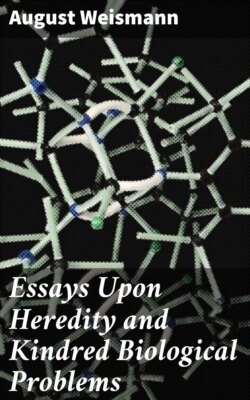Читать книгу Essays Upon Heredity and Kindred Biological Problems - Weismann August - Страница 13
На сайте Литреса книга снята с продажи.
Note 9. Death by Sudden Shock.
ОглавлениеTable of Contents
The most remarkable example of this kind of death known to me, is that of the male bees. It has been long known that the drone perishes while pairing, and it was usually believed that the queen bites it to death. Later observations have however shown that this is not the case, but that the male suddenly dies during copulation, and that the queen afterwards bites through the male intromittent organ, in order to free herself from the dead body. In this case death is obviously due to sudden excitement, for when the latter is artificially induced, death immediately follows. Von Berlepsch made some very interesting observations on this point, ‘If one catches a drone by the wings, during the nuptial flight, and holds it free in the air without touching any other part, the penis is protruded and the animal instantly dies, becoming motionless as though killed by a shock. The same thing happens if one gently stimulates the dorsal surface of the drone on a similar occasion. The male is in such an excited and irritable condition that the slightest muscular movement or disturbance causes the penis to be protruded[27].’ In this case death is caused by the so-called nervous shock. The humble-bees are not similarly constituted, for the male does not die after fertilizing the female, ‘but withdraws its penis and flies away.’ But the death of male bees, during pairing, must not be regarded as normal death. Experiment has shown that these insects can live for more than four months[28]. They do not, as a matter of fact, generally live so long; for—although the workers do not, as was formerly believed, kill them after the fertilization of the queen, by direct means—they prevent them from eating the honey and drive them from the hive, so that they die of hunger[29].
We must also look upon death which immediately, or very quickly, follows upon the deposition of eggs as death by sudden shock. The females of certain species of Psychidae, when they reproduce sexually, may remain alive for more than a week waiting for a male: after fertilization, however, they lay their eggs and die, while the parthenogenetic females of the same species lay their eggs and die immediately after leaving the cocoon; so that while the former live for many days, the latter do not last for more than twenty-four hours. ‘The parthenogenetic form of Solenobia triquetrella, soon after emergence, lays all her eggs together in the empty case, becomes much shrunken, and dies in a few hours.’ (Letter from Dr. Speyer, Rhoden.)
